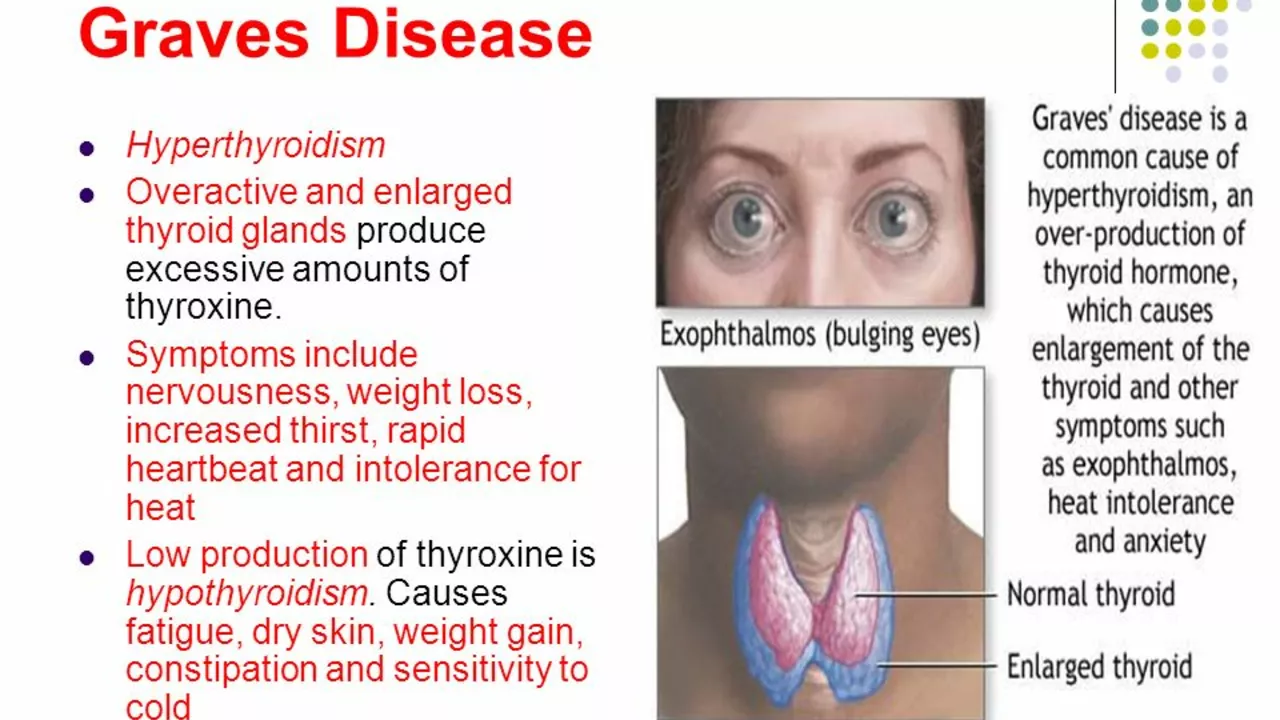Graves' disease — what it looks like and what you can do
Graves' disease happens when your immune system tells the thyroid to overwork. It’s the most common cause of hyperthyroidism and affects roughly 1 in 200 people, mostly women. If your heart races, you sweat more, or your weight drops without trying, Graves' might be behind it. The good news: with the right care most people get their symptoms under control.
Tell-tale signs and how doctors confirm it
Common symptoms are fast heartbeat, anxiety, tremor, weight loss, heat intolerance, hair thinning, and more frequent bowel movements. Eyes can be a big clue — bulging eyes, dryness, or double vision point to Graves' ophthalmopathy. Your doctor will check blood tests for thyroid hormones (T4/T3) and TSH, plus antibodies called TSI or TRAb. Sometimes imaging like an ultrasound or uptake scan helps decide the best treatment.
Treatment options
There are three main approaches: anti-thyroid medications, radioactive iodine (RAI), and surgery. Anti-thyroid drugs slow hormone production and can be a long-term option or a bridge to other treatments. RAI uses a small radioactive dose to shrink the thyroid—it's effective but often leads to low thyroid function that needs lifelong replacement. Surgery removes part or all of the thyroid and is considered when medication or RAI aren’t suitable, or when a large goiter or suspicious nodule is present. Each option has trade-offs; discuss risks and follow-up plans with an endocrinologist.
For fast symptom relief doctors may prescribe beta-blockers to slow heart rate and reduce tremor. That’s short-term relief, not a cure, but it helps you feel better while other treatments kick in.
Managing eye problems and daily life
If your eyes are affected, see an eye specialist experienced with Graves' disease. Simple steps like lubricating drops, sunglasses, and avoiding smoke help a lot. Severe cases may need steroids, radiation, or surgical care. At home, aim for steady sleep, stress control, balanced meals, and quit smoking — smoking worsens eye disease and reduces treatment effectiveness.
Keep regular follow-up blood tests until your thyroid levels are stable. If you plan pregnancy or are already pregnant, tell your doctor—treatment choices can change because pregnancy needs special care.
Watch for red flags: very fast heart rate, fainting, chest pain, sudden vision loss, or signs of thyroid storm (high fever, extreme agitation, vomiting). Those need immediate medical attention. Otherwise, with proper monitoring and a treatment plan, most people with Graves' disease lead active, normal lives.
If you suspect Graves' disease, start by booking a visit with your primary care doctor or an endocrinologist. Early diagnosis makes treatment simpler and reduces the chance of complications.

Graves' Disease and the Workplace: Tips for Balancing Health and Career
- 18 Comments
- Jun, 26 2023
As someone who has been personally affected by Graves' disease, I understand the challenges it presents in balancing health and career. In the workplace, it's important to prioritize self-care by taking breaks when needed and managing stress levels. Communicating openly with colleagues and supervisors about your condition can help create a supportive environment. Additionally, working with a healthcare team to manage symptoms and treatment can make a significant difference in maintaining career success. Remember, it's essential to find a balance that works for you and to not be too hard on yourself during this journey.




